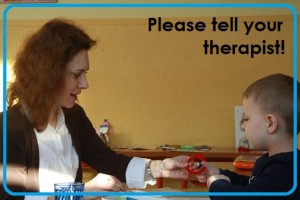This topic came up twice last week, once with me as the patient at the dentist and again with a parent of a child I see – what should you ask and when. I would like to say that my dentist was brilliant, considering it was the first time we had met and I am a nervy patient at best. He listened to ALL my questions and took the time to answer them and explain really well – thank you Mr. Dentist! It then came up again, when one brave parent asked me to go over the words that I expected her child to be using. I hope I explained as clearly as the nice dentist did to me!
So, there are a number of things that as parents/ carers of the children we see, you should feel happy to ask or tell us and I wish that more people would. It may not always be easy, but it can make a difference to your child so it’s worth speaking up!
– If you feel that what the therapist saw that day wasn’t a good example of ‘the norm’ for your child. Maybe they were silent and can normally do a lot more. Maybe they were really chatty and you hadn’t heard half those words before. Maybe, by complete chance the words the therapist asked your child they could say easily, but you know they struggle on others. Maybe your child is just getting or recovering from a dreadful cold. These are all really important things to let the therapist know so they are better able to judge where your child is developmentally. They often only get a small snap shot so they need to know if it’s a true representation.
– If you don’t understand something the therapist says. It can be really hard to stop and ask for clarification, but is so important. You need to make the most of your appointments and if you are being given information about your child, or advice that you don’t understand, this will not help. No therapist should mind going over something again. It’s very easy to get caught up in words that we use all the time and forget that not everybody does. Words like comprehension, expression and phonology are common speech therapy words, but not for everyone!
– If you really aren’t that concerned but someone has referred you. Or equally if you are really concerned about something. This all helps fill out the picture for us and helps inform our decisions.
– If anybody else is involved or has been in the past. It’s useful for us to know if you have seen a speech therapist before, or if you are waiting for a hearing test or doctor’s appointment.
– If you disagree. Now this is tough. Maybe you could ask for clarification, or say that you’re not sure. But it’s important to have the discussion. It maybe that the therapist doesn’t have all the information and might make a different decision if they did. It might be that the therapist needs to explain their decision again. It maybe something outside of their control, but at least you will know.
– If you haven’t received something or haven’t heard from us. We are all human and make mistakes! If you are expecting something that doesn’t arrive- do let us know!
Just remember that we as therapists want to do our best and help, so if you are leaving confused or unhappy speak up!
And finally…
– If you are pleased! It’s always lovely to get feedback that you are being helpful and making a difference.
If you have found this post useful, do check out our e-book, which is full of practical advice to help you and your child at every step of the way through the speech therapy process.







Leave a Reply